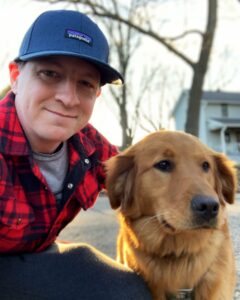Confessions of a Steward with Joel Salatin
Redemption permeates the Bible as the ultimate healing of the human problem. But like many theological concepts, God offers practical object lessons to physicalize spiritually heady principles.
Obviously, the kinsman redeemer concept epitomized by the Boaz-Ruth relationship is one stellar example. Boaz, an older bachelor, redeems Ruth’s legacy and brings this young widow directly into the lineage of David and the Messiah. How cool is that?
At its core, redemption is about restoration. In the human experience, it’s restoring all that was lost from Eden’s eternal state. As such, the Biblical redemption story is intricately woven with Creation, Jerusalem, the New Jerusalem, and new earth. To dismiss the physical earth as a visible, visceral object lesson of spiritual restoration cheapens the human privilege and responsibility toward the land.
Too often, the Christian community dismisses visceral land responsibility with the notion that “we’re just pilgrims passing through” and “it’s all going to burn up someday anyway.” Of course, Romans chapter 1 clearly warns against worshiping creation, but is viewing our land as something more than dirt and rocks idolatry? I suggest not.
“Is viewing our land as something more than dirt and rocks idolatry? I suggest not.”
If one physical thing responds dramatically to stewardship, it’s the soil and the land. It can be abused to barrenness, or it can be redeemed into abundance. The story of human civilization and agriculture specifically follows a pattern of abuse, not redemption.
Perhaps no place on earth demonstrates this as dramatically as the land of Israel. I recently spent a week there visiting farmers and encouraging them. The ministry HaYovel (Jubilee) hosted and coordinated the visit, and I spent the entire time in Judea and Samaria, where 80 percent of the Bible took place. The anti-Jewish world calls this area the West Bank, which is a way to refuse to acknowledge it’s a part of Israel and is really owned by Jordan.
The contrast between that land today and what it was during Biblical times is quite profound. It’s been fought over for thousands of years. When you realize that during King David’s time, the land had bears and lions and enough trees to lose armies and hang Absalom, could any place on earth be more indicative of abuse and exploitation? Mile after mile has not a tree on it. Several feet of topsoil has eroded, leaving nothing but a jumble of rocks. Walking is extremely difficult due to the wheelbarrow-sized rocks and truck-sized boulders.
As I stood with farmers looking out on their acreages, I found myself completely intimidated by the barrenness. And yet these farmers, coming back into these lands to fulfill the Genesis 12 Abrahamic covenant, see themselves as restoring God’s control and fulfilling prophecies about blooming deserts and new abundance.
Avri Ron, an early farmer once the lands were restored to Israeli control after the 1967 Six Days’ War, told me that, “A man who does not believe in miracles is not realistic.” He recited numerous miracles he’s witnessed restoring his own farm. “The soil is to the farmer like a bride to a groom,” he said, pointing out that the root etymology of “man” and “land” are the same. “Every mountain is my wife and my life. When you come to the land like you come to your wife, it will respond to you. You love her; she loves you back.”
Describing the 2,000-year Jewish vacancy in the land after Rome conquered Jerusalem in 70 A.D., Avri said: “When the man goes away, his wife wears widow clothes. Now the man has come back, and the land is wearing her marriage clothes. Even when you’re 99 you still plant trees because 1,000 years from now couples will come and eat and kiss under the tree you planted.”
Yes, as Avri spoke, big tears rolled down my cheeks. If this kind of language doesn’t light the fire of your heart, your wood is wet. In Western society, we don’t talk like this. Is this idolatry? No, it’s a deep love for what God made. He is building soil and bringing back production where rocks prevail.
To read the full story, purchase this digital back issue:
Subscribe today to get the full stories in print each month!
Or purchase a May 2023 back issue in print here.
__________
Joel Salatin co-owns, with his family, Polyface Farm in Swoope, Virginia. Four generations of his family currently live and work on the farm, and his farm services more than 5,000 families, 50 restaurants, 10 retail outlets, and a farmers’ market with salad bar beef, pigaerator pork, pastured poultry, and forestry products. When he’s not on the road speaking, he’s at home on the farm, keeping the callouses on his hands and dirt under his fingernails, mentoring young people, inspiring visitors, and promoting local, regenerative food and farming systems. Salatin has published 15 books, and he is the editor of The Stockman Grass Farmer, granddaddy catalyst for the grass farming movement. He passionately defends small farms, local food systems, and the right to opt out of the conventional food paradigm.










Leave a Reply